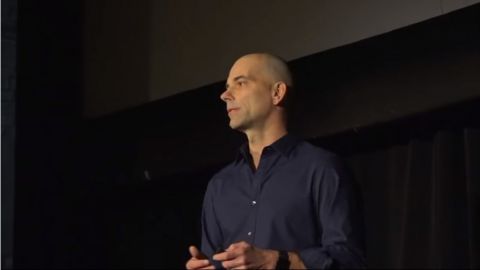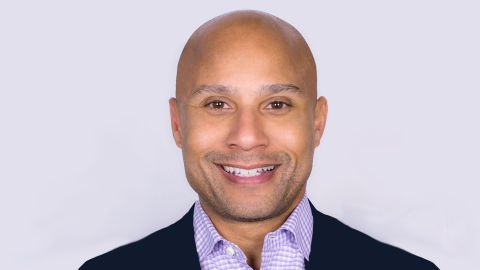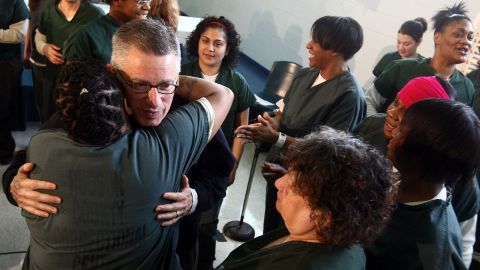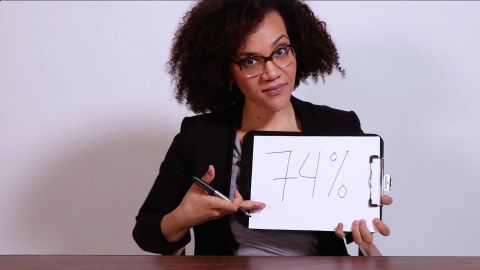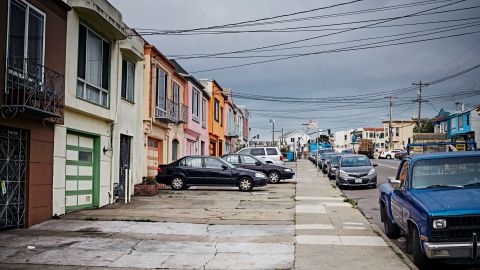Reflecting on “What’s Your American Dream Score?” Five Years Later
By Bob McKinnon
When you start life at the bottom rung of the economic ladder – as I did – and then find yourself near the top, it is only natural to ask yourself: “How did I end up here?”
Many think the answer is simple: hard work.
In my case, my mom was a bartender in a poor town near Boston. She worked hard to give us a better life.
I worked hard in school and got into college and worked hard there and got a job in New York. I worked hard in my career and then started my own company, where I also worked hard.
Today, I’m living the American dream in an affluent town with three beautiful children, a loving wife and nice things. It’s the classic Horatio Alger, pull yourself with your bootstraps, narrative.
But if this is the case, why have I felt so angry and so guilty over the course of my life?
Angry because I would look at other people who seem to have had it so much easier. Guilty because I knew too many people who were left behind. People in towns where I grew up who didn’t have the same kind of positive outcomes.
This question nagged me because I understood that hard work could not be the sole answer. Yes, I did work hard. And hard work can make the American dream possible. But it doesn’t always make it probable. I know I did not work any harder than my mom, who worked late shifts as a bartender. I didn’t work any harder than my brother, who worked 30 years on the factory line of Harley-Davidson. I didn’t work any harder than my sister, who drove 18-wheelers across the country despite the fact that she had lupus, which brought her great pain.
I didn’t work any harder than friends who had tough lives and fewer opportunities. Some ended up in jail. Others ended up dead.
So, what is the answer beyond hard work?
Studying this question since 2012, I’ve been fortunate to go around the country and talk to Americans about their dreams and challenges. In conjunction with Public Agenda, my organization Moving Up Media Lab conducted a national study exploring Americans’ beliefs about what contributes to our life outcomes. I’ve met with other researchers and studied the science behind social mobility and – perhaps more importantly – the psychology behind it.
I began writing about what I was learning and feeling in my “Moving Up Mondays” newsletter. I created a guide called “Moving Up: The Truth About Getting Ahead in America” that looked at various factors, including hard work, that research showed contributed to mobility.
My goal went beyond self-discovery. I wanted to inspire others to reflect on who and what contributed to where they are in life.
In 2017, Alfred Ironside, then at the Ford Foundation, asked if I had any ideas on how to make this type of reflection easier and more accessible for ordinary people.
With support from the Ford Foundation and Chasing the Dream, a reporting initiative of The WNET Group, my organization created “What’s Your American Dream Score?”. It’s a simple quiz, taking 3-5 minutes, that poses ten questions about life – each representing a factor known to contribute to success.
Once you complete the quiz, you receive a score and a list of factors that may have helped or hindered your efforts to achieve success. The higher your score, the more you’ve had to overcome. The lower your score, the more you had working in your favor.
My score is 67. It shows that while I had many difficulties to overcome – including a childhood marked by poverty – I had almost as many factors working for me. These included a good education, friends from higher socioeconomic classes who made important connections for me, and programs created by people I’ve never met. Like Claiborne Pell – the father of the Pell Grant that made college possible for me – and Joan Ganz Cooney, the creator of “Sesame Street,” which served as my preschool.
It is quite humbling to reflect upon what has happened for me since “What’s Your American Dream Score?” was released in 2017. Hundreds of thousands took the quiz within the first two months. To date, almost a million people in 220 countries have learned their scores.
Google Analytics tells me that “What’s Your American Dream Score?” is especially popular among people under thirty. Presumably this is aided in part by its use in schools. PBS LearningMedia developed a curriculum around the quiz. Teachers and professors have reached out independently to tell me they have created their own content around this tool. I myself have used it in classes I teach at Parsons and City College. The conversations this quiz inspires are rich and nuanced. This has been among my most rewarding experiences as a teacher, as both students of privilege and students who struggle acquire a better understanding and appreciation of what has led them to sit in that classroom.
These aren’t the only conversations that this quiz has enabled. Based on its success, Chasing the Dream decided to support and distribute “Attribution w/ Bob McKinnon” my podcast on success and gratitude. Each episode features an in-depth and often moving reflection by my guest about their journey and what has contributed to where they ended up.
With this reflection comes great responsibility – and even greater opportunity.
As I wrote several years ago about my own experience seeing people taking the quiz:
“These were real people taking five minutes out of their life, looking for something. Some received comfort, gratitude, and compassion. A few were agitated or frustrated by what their score represented. One woman who had one of the highest scores I had seen (meaning she had almost everything working against her) wrote, “That was amazingly depressing.”
It was a stark reminder that a quiz like this should be the beginning of a journey not an end in and of itself. I wanted to reach out to that woman and assure her that her journey was not over and there were ways in which more factors could be put to work in her favor.”
While I couldn’t reach out to her, many people have written online or emailed me privately about their scores and, more importantly, their experiences. Some challenge the premise, react negatively to the inclusion of factors like race and gender, point out the absence of certain factors holding them back (relationship issues, domestic violence, mental health issues, disabilities) that are not explicitly named in the quiz but are implicit in some of the questions. Others express gratitude and choose to start conversations online or in their home about their experiences.
It is not surprising, given the divided state of our nation, that these exchanges can sometimes become heated. Some interpret this quiz as undermining hard work and personal agency, while others see it only as a test to see how much privilege one has.
What has been remarkably consistent is how productive and civil all of these exchanges have been. That’s right, I said all. Even those who had deep concerns or reservations about a quiz like this were appreciative of what I was trying to do, and were open to reflecting on their own journey. Which is all I could have asked for.
As I often tell them in our exchanges, it’s impossible to quantify how or why someone ended up where they did in life. Each person is the best scorekeeper of their own life. This quiz simply provides an opportunity to pause and reflect on your own journey.
The Chasing the Dream website captured several people’s responses to their own scores – which speaks to the value that people find in this reflection.
For example, Nicole Valentine of Nashville, whose score was 63, wrote:
“This quiz really made me consider all of the opportunities afforded to me and the obstacles that I overcame. The questions made me look at my life like a puzzle; there were many challenges, similar to finding the right spot for an irregular puzzle piece. However, with the help of my family, friends, and mentors I have been able to develop resiliency and feel supported. Reflecting on good and bad times made me feel like I can handle the future. Wow! I can’t believe those ten questions had an impact on me like that.”
It is important to note that taking this quiz is simply capturing a point in time. Both our life circumstances and our attitudes change.
Just consider what has happened in the world during the five years since “What’s Your American Dream Score?” was created in 2017. We have experienced a pandemic, a racial reckoning, a financial crisis, and a country deeply divided, politically and culturally.
Julian Rivera was a high school student in Escondido, CA when he took the quiz in 2017. He said, “I wonder how my score will be next year.” I wonder too.
Ideally, our quiz scores go down as life goes on – meaning that we have more things working in our favor. I think of Kayla Leiser, whose score was 74 five years ago. At that time, she wrote:
“I grew up in three different states, changing schools and environments often, as well as homes. My mother was a drug-addict and at the time I did not know my father was even alive, from the age of 6 to the age of 14 I was bouncing around the foster system. Luckily I was adopted by a very kind elderly couple who began to teach me how to live a healthy and happy life. I am now doing pretty well compared to my and my parents’ pasts. I am graduating from an independent charter school within a couple months and moving up to Alaska to go to college for an Anthropology major.”
Hopefully, by now she has graduated from college, has a good job, as well as great friends and mentors. Maybe her parents are doing better too. A lower score for Kayla today would reflect more progress and less struggle.
At the same time, I know that scores can go up too.
When I originally created this quiz, I compared my score to those of my siblings. While we had a shared youth, our adulthoods have differed dramatically. We all have had our fair share of happiness, but my siblings have had far more struggles than I – particularly my sister. Significant health issues have complicated her journey, while I – knock on wood – have enjoyed a far healthier life. Her score has gone up, while mine remains steady.
Each time I take the quiz, I feel gratitude for the help I’ve had along the way and am reminded that others may not be as fortunate as I am today. I’m left with a desire to reach out to thank those who played an important role in my life, and to find ways to support others who might be struggling.
As we approach Labor Day, I hope you get the chance to kick back, relax and mark the end of summer. For many, it will be a well-earned day off. As such, it is natural and expected that we celebrate ourselves and our own hard work. Between the picnics and parades, we can perhaps also find a few minutes to celebrate and recognize those who have worked hard for us.
Start by taking the quiz for a little inspiration.
Then pick up the phone and thank your family, who sacrificed for you. Send a note on LinkedIn to an old boss who gave you your first job, raise, or promotion. Post something online thanking your friends for their support or connections. Maybe give a shout-out to strangers who built something that has helped propel you forward. Do something that recognizes the many contributions others have made to your journey. Maybe even find a way to give back. Here is a short list of organizations working to help others move up in life that could benefit from your support.
After all, that’s the true spirit of Labor Day and the real answer to the question, “How did I end up here?”
Bob McKinnon writes the “Moving Up Mondays” newsletter, hosts the podcast “Attribution w/ Bob McKinnon” and is the author of The New York Times bestselling children’s book “Three Little Engines.”


